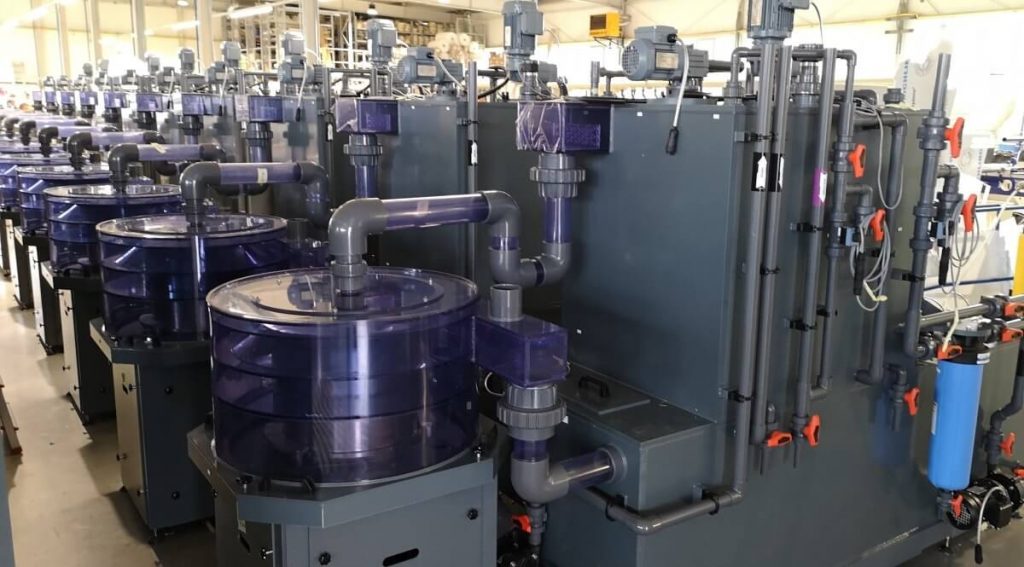Recycling
Metal waste can be processed in various ways. We at KK SOLUTIONS are aware of the economic and ecological importance of the recycling process together with our recycling partners. Therefore we offer our customers from the recycling sector the possibility to produce plants for metal recycling in different ways. Convince yourself and profit!
Recycling is important to save the raw material reserves of our earth and to reduce the emission of carbon dioxide as greenhouse gas. Recycling means returning processed materials from old products to their condition as raw materials, if possible, and then reusing them.
Precious metal recycling is the recovery of precious metals from any product/waste that contains precious metals.
The most common processes are:
- Electrolysis
- Precipitation
- Reduction

Electrolysis
Electrolysis is the name given to a chemical process in which electric current forces a redox reaction. It is used, for example, to extract metals, or to produce substances that would be more expensive or virtually impossible to extract by purely chemical processes. Examples of important electrolyses include the extraction of hydrogen, aluminum, chlorine, and caustic soda.
Electrolysis requires a DC power source to provide the electrical energy and drive the chemical conversions. Some of the electrical energy is converted to chemical energy. Electrolysis could be used for energy storage, such as in the electrolysis of water, which yields hydrogen and oxygen, which have been proposed as the energy sources of a hydrogen economy. By reversing water electrolysis in a fuel cell, about 40% of the electrical energy originally used can be recovered.
Electrons are transferred in the chemical reactions that occur during electrolysis. They are therefore always redox reactions, with oxidation occurring at the anode (electric pole) and reduction at the cathode; oxidation and reduction processes are therefore spatially separated, at least in part.
Precipitation
In chemistry, precipitation refers to the removal of a solute from a solution. This occurs when its solubility is exceeded due to changes in its environmental conditions, e.g., addition of suitable substances (precipitants), changes in temperature and pressure, evaporation of the solvent, or changes in the polarity of the solvent. Precipitation takes place as a precipitate in the form of amorphous flakes or crystalline material.
An added precipitant may become part of the precipitate or convert the solute to a less soluble one, or only change the solvent properties of the solvent. The precipitates of the precipitated solids are initially mostly microcrystalline or amorphous. Over time, recrystallization may result in the formation of a more stable crystal modification. Often these particles enlarge with aging due to additional agglomeration. This makes them easier to filter or forms a sediment. As the precipitate ages, its solubility often decreases further.
The formation of the precipitate or precipitate by precipitation can be triggered in several ways, by precipitation reactions, change in pH, or exceeding the solubility product. The liquid above is called the supernatant.
Reduction
A reduction is a chemical reaction in which an ion or atom, as such or as a constituent of a molecule, accepts one or more electrons, thereby lowering its oxidation state. The reduction of the oxidation state is formally indicated by the reduction of the so-called oxidation number of the atom in the molecule that is responsible for the reduction.
The decrease in the oxidation number corresponds to the number of electrons absorbed. The reducing agent is the substance, atom, ion or molecule that has given up the electrons and is thus oxidized. Both coupled reactions are called the two partial reactions of the redox reaction taking place.
KK SOLUTIONS is your partner for recycling!
Take advantage of the opportunities offered by KK SOLUTIONS' production solutions! You can already turn our recycling expertise into your business success.
Find out about other products and services we provide for our business partners and become one of them. Contact our recycling experts!
